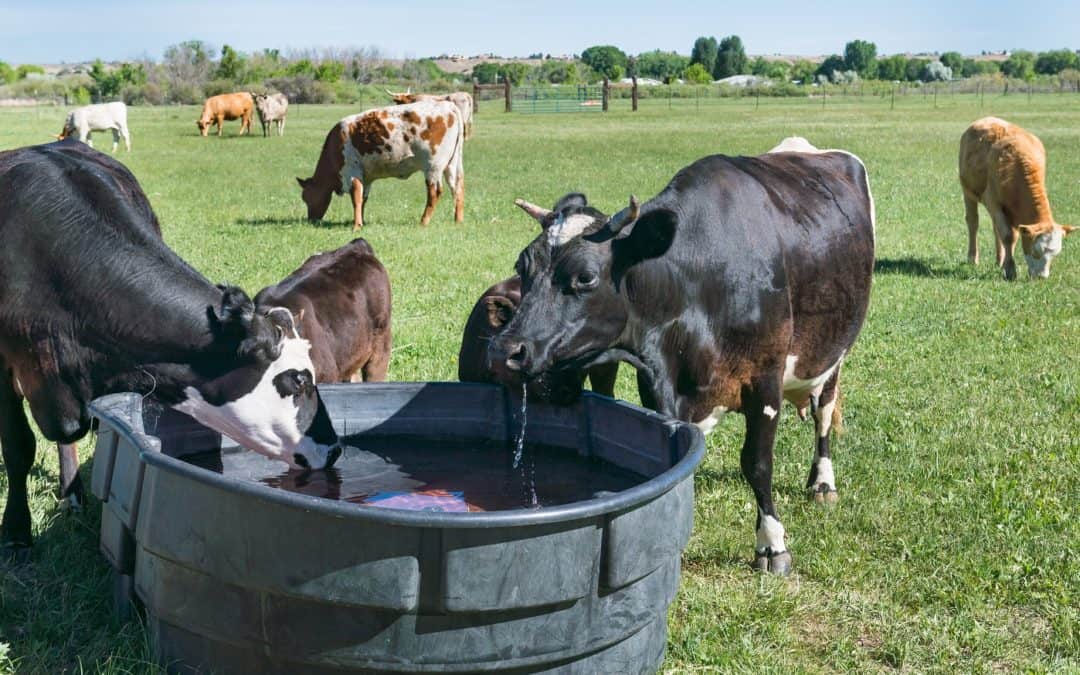The COVID pandemic has change our lives in so many ways. Although the ‘home farming’ trends started long before the pandemic, our need to stay close to home and have good and healthy food on hand has prompted many homeowners to expand they home farming. Whether you have vegetables or other crops or livestock such as chickens (very popular now), ducks, pigs or cows, water will be a necessity.
Many farm owners overlook the importance of maintaining clean and uncontaminated drinking water for their livestock. Keep in mind you will need to have water near the location of your animals. (Or access to water for your crop fields)
As water is an indispensable nutrient for farm animals, depriving them of a high-quality supply impacts their lactation, reproduction, and overall health, which can eventually lead to illness, death, and economic loss.
To ensure that your livestock is well-hydrated, installing water troughs dedicated to their consumption is a must. Also, cleaning and maintenance are paramount aspects of keeping your animals healthy and disease-free. Hence, here are some tips to remember when installing your water troughs.

Choose An Appropriate Size and Location
Livestock animals tend to be aggressive during their food and water consumption. If you have more than one farm animal, it’s important to choose the right size of water trough that can provide sufficient space for each herd batch to drink together. If you’re on the hunt for the best stock throughs, you can check The Tank Factory website as they offer high-quality stock troughs in varying sizes and capacities.
Also, you need to find a strategic position to place their water supply that’s accessible for all animals. For example, the ideal location can be in the middle of their pen or paddock. If you look after plenty of livestock, it would be better to install many water troughs.
Permanent vs. Temporary Water Trough
Generally, you can install two types of water troughs on your farmhouse: permanent and temporary.
Permanent or fixed water troughs are settled in one location and can’t be relocated. They’re typically made of concrete, which is strong and heavy, so you don’t have to worry about your animals tripping over and overturning them.
Temporary water troughs, on the other hand, are made from lightweight materials like polyethylene. You can take advantage of their mobility by implementing tactical grazing and allow even distribution of nutrients to plants. Plastic water troughs are also easier to clean.
Calibrate The Right Water Pressure and Flow
Float valves are widely used in various water system applications. Do note that installing a float valve isn’t enough as you also have to ensure that you’re using the right float valve for flow and water pressure. For example, higher water pressure can cause rust and sediments from pipe to wear away and mix with your water.
During hotter months, it’s also important to secure a continuous water supply and immediate refilling. Setting the right water pressure and flow allows your livestock to enjoy fresh, non-stagnant water free from pollutants.
Take Note of Water Requirements
Animals have different water requirements due to a combination of health and environmental factors:
- Temperature and climatic conditions
- Animal’s age and condition
- Class and species of stock
- Production status
- Nature and quality of feed
- Intake of dry matter
- Water quality
If you have many types of livestock, you should be on the constant lookout for how much water they consume. Here’s the average daily water intake of some types of livestock in liters (L):
- Dairy cows (dry): 45
- Dairy cows (in milk): 70
- Calves: 22
- Beef cattle: 45
- Nursing ewes (dry feed): 9
- Mature sheep (dry pasture): 7
- Mature sheep (irrigated pasture):5
Also, your livestock’s water requirements are the reason why you should install the right size, depth, and quantity of water troughs placed in the right locations.
Takeaways
Water troughs assist your livestock operations by providing a constant water supply, but they don’t guarantee that your animals can drink clean and uncontaminated water 24/7. It’s your responsibility to check, change, and clean their water troughs to maintain water cleanliness. You can also invest in accessories like a water filter to supply clean water.
If you are looking for a professional in the Rochester and Finger Lakes Region of New York, you’ll find them at FindTheHomePros.com.

Recent Comments